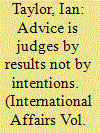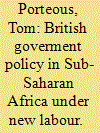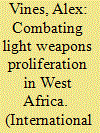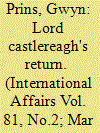|
|
|
Sort Order |
|
|
|
Items / Page
|
|
|
|
|
|
|
| Srl | Item |
| 1 |
ID:
060979


|
|
|
|
|
| Publication |
Mar 2005.
|
| Summary/Abstract |
Chancellor Gordon Brown has declared that 2005 will be a milestone in the United Kingdom's campaign to meet the UN Millennium Goals. Owing to Britain's chairmanship of both the G8 and the European Union in 2005, Brown believes that an opportunity to raise the continent's star in global politics presents itself. This comes after the launch in 2004 of the Blair Commission for Africa and a recent spate of high profile interventions by assorted politicians and famous musicians. It also follows a trend begun at the G8 meetings where Africa is placed on the G8 agenda. Such an interest in the continent is to be welcomed. Yet this article contends that Gordon Brown's assumptions regarding Africa's troubles, and the ingredients found within his proposals, are mistaken and need rethinking. The article argues that Brown's approach to Africa's problems is based on incomplete information or a misreading of the situation, and by default may serve to prolong Africa's crises rather than alleviate them.
|
|
|
|
|
|
|
|
|
|
|
|
|
|
|
|
| 2 |
ID:
060978


|
|
|
|
|
| Publication |
Mar 2005.
|
| Summary/Abstract |
British government policy in Africa under Labour has been motivated by a combination of humanitarianism and self-interest. The policy has been shaped principally by the Department for International Development (DFID), but also by the Foreign and Commonwealth Office (FCO) and by Prime Minister Tony Blair himself, as he has become more interested in Africa issues. The main focus of the policy has been on poverty reduction and development. The approach has been multi-dimensional, aiming to tackle the principal obstacles to development such as conflict, HIV, debt, governance and trade barriers. The UK has sought to increase its leverage in Africa by working multilaterally with its allies and through the UN, the World Bank and the EU. But the policy has been hampered by the inherent difficulty of promoting sound development policies in weak states, by a lack of UK leverage to affect change, and by a UK preference for statist solutions. Strategic and commercial objectives pursued by the FCO and the prime minister have sometimes appeared as being at odds with the developmental objectives of DFID. Post-9/11 concerns have reinforced the UK's motivation for dealing with Africa's problems, particularly the problems of weak and failed states. But western policies related to the war on terror may give rise to new contradictions and complicate the UK's developmental efforts in Africa.
|
|
|
|
|
|
|
|
|
|
|
|
|
|
|
|
| 3 |
ID:
060986


|
|
|
|
|
| Publication |
Mar 2005.
|
| Summary/Abstract |
A number of states in the Asia-Pacific region have long been recognized to be indifferent or even hostile to the international human rights regime and to have rather poor records when it comes to protection of the right to personal integrity. Since 9/11 many of these same states have become closely involved in the US-led anti-terrorist campaign, and in the course of that involvement have been identified with the serious abuse of the personal security rights of those held in detention as terrorist suspects. This article uncovers some of the bases for that indifference to human rights treaties and why the human rights records of some of these states have become of even greater concern, particularly to domestic and transnational NGOs, in the contemporary anti-terrorist era. It argues that long-standing factors associated with intra-state armed conflict and separatist rebellions, the governmental tendency to accuse domestic NGOS of following a western rights agenda, and strong attachment to the non-interference norm have undercut official governmental concerns about the abuse of the right to personal security. More recently, emulation of the worst aspects of US anti-terrorist behaviour has given rise to a sense of impunity in some cases, and has justified a militarized response to political and religious unrest in others. Finally, the difficulties that the local human rights NGOs have had in making their case to the wider domestic populations have been compounded in a climate where many of their fellow citizens are fearful of the apparent rise in support for terrorist causes and methods.
|
|
|
|
|
|
|
|
|
|
|
|
|
|
|
|
| 4 |
ID:
060982


|
|
|
|
|
| Publication |
Mar 2005.
|
| Summary/Abstract |
Light weapons proliferation is a serious problem in West Africa. A regional moratorium on imports of small arms and light weapons has not worked and UN arms embargoes on Sierra Leone, Liberia and Côte d'Ivoire have had limited impact. The Economic Community of West African States is currently drafting a new binding legal instrument aimed at controlling flows in West Africa but this will only succeed if the heads of state and government seriously adopt it. This needs to include greater compliance of UN sanctions, international reform of the End User Certificate system, mapping the spread of artisan production and an examination of ammunition imports to West Africa. Better control of ammunition imports in particular may assist the combat of light weapons proliferation as well as the comprehensive destruction of weapons from disarmament efforts. The illicit weapons trade in West Africa is increasingly transnational and it requires regional and international cooperation and support to combat it.
|
|
|
|
|
|
|
|
|
|
|
|
|
|
|
|
| 5 |
ID:
060983


|
|
|
|
|
| Publication |
Mar 2005.
|
| Summary/Abstract |
South Africa's foreign policy, conducted in an ad hoc and haphazard fashion under President Nelson Mandela, has been consolidated under the presidency of Thabo Mbeki. This article first outlines five consistent policy themes: Africa and Africanist; democracy and respect for human rights; a holistic understanding of security; a pacific approach to conflict resolution; and multilateralism. The article then identifies and attempts to explain a number of significant inconsistencies in relation to these themes, including Mbeki's 'quiet diplomacy' on Zimbabwe; his denialist position on HIV/AIDS; South Africa's controversial arms procurement programme; and its domestic xenophobia. Some of these inconsistencies have undermined the country's international credibility and at times overhshadowed its considerable achievements.
|
|
|
|
|
|
|
|
|
|
|
|
|
|
|
|
| 6 |
ID:
060987


|
|
|
|
|
| Publication |
Mar 2005.
|
| Summary/Abstract |
Edmund Burke argued that abstract or universal rights to food and medicine were less valuable than the aid of 'the farmer and the physician'. His point remains unanswered. Human rights receive universal lip service, but their status and justification remain murky. From one view they are universal requirements matched by counterpart universal obligations: but if so they cannot be defined or created by international Covenants. From another view they are defined by convention and have force only when states ratify international Covenants: but if so, they are not universal. This matters particularly for rights to goods and services, such as rights to food and health care. These rights require the active collaboration of those who are to deliver needed goods and services: yet this active engagement is endangered by imposing overly complex requirements in the name of compliance with human rights. Excessive demands for compliance, and excessive emphasis on complaint, compensation and blame as remedies for non-compliance, endanger the effective contribution of the farmer and the physician, and of others on whom the provision of needed goods and services most depends.
|
|
|
|
|
|
|
|
|
|
|
|
|
|
|
|
| 7 |
ID:
060981


|
|
|
|
|
| Publication |
Mar 2005.
|
| Summary/Abstract |
This article reviews western donor support for building African peace and security architecture, specifically in relation to G8 efforts to engage in the capacity-building process in line with commitments made in the Joint Africa/G8 Plan to Enhance African Capabilities to Undertake Peace Operations (the Joint Plan) agreed between G8 and key African leaders at the G8 Summit in Evian in 2003. It describes a project by the New Security Issues Programme at Chatham House, carried out jointly with the Peace and Security Programme at the United Nations Association-UK and the Institute for Security Studies in Pretoria, to provide strategic input into implementing the Joint Plan. The article outlines the background to western involvement in peace and security capacity-building in Africa, the nature and current status of the African peace and security architecture and some key challenges to the G8/Africa capacitybuilding process particularly African institutional human resource capacity and coordination among the various players involved. Finally, it maps out potential priorities for future progress in taking the capacity-building process forward.
|
|
|
|
|
|
|
|
|
|
|
|
|
|
|
|
| 8 |
ID:
060984


|
|
|
|
|
| Publication |
Mar 2005.
|
| Summary/Abstract |
This article suggests that the Annan High Level Panel that reported in December 2004 has produced the most important strategic document to be published by the UN since 1945, eclipsing the now distinctly dated Millennium Development Goals. It documents how it is unusually cogent and candid for a Blue Ribbon exercise. This article starts by describing both the long wave and the immediate events within which the Panel's work exists. The world is now plainly moving through the biggest change of course since the late eighteenth century, which the Panel also discusses, and which was punctuated in 2002 3 by a specific crisis over Iraq. The aftermath of that crisis was the occasion for the secretary-general of the United Nations to establish a High Level Panel with a wide mandate, to describe the new environment of international peace and security and to recommend changes to refurbish the United Nations in order to face new threats, challenges and change. The article analyses the Panel's strategy to obtain action on its key recommendations. These are to make routine the exercise of the responsibility to protect individuals at risk in failed or collapsed states by 'full spectrum' UN interventions embracing peace-enforcement, -keeping, -making and -building. The mechanisms recommended are described and the judgement made that the shrewd presentation of the brokerage of different interests gives a modest but real chance of success. The Panel also addresses the matter of membership of the Security Council but in a way which will enable the likely deadlock over that question later this year to be contained so as not to impede action on other matters. In sum, the High Level Panel promises to be Kofi Annan's best legacy.
|
|
|
|
|
|
|
|
|
|
|
|
|
|
|
|
| 9 |
ID:
060980


|
|
|
|
|
| Publication |
Mar 2005.
|
| Summary/Abstract |
Much attention has been given in recent years to the paradoxical fact that huge flows of money from petroleum appear not to have brought prosperity to the African countries that produce it, but may instead have helped cause poverty, economic decline and conflict. Issues such as human rights abuses near oil installations and environmental damage have often captured the headlines, but these, while important, are peripheral to the main problems: the Dutch Disease, whereby an influx of oil money causes real exchange rates to appreciate, making local industry and agriculture uncompetitive; the damage that petroleum money causes to institutions, incentives and overall governance; and the volatility of oil prices and revenues. This article will look at the volatility problem, and how oil contracts tend to make matters even worse. They are like this for long-established technical, political and historical reasons, and there is consequently a widespread belief in the industry that change is not possible. This defeatist attitude needs to be vigorously challenged.
|
|
|
|
|
|
|
|
|
|
|
|
|
|
|
|
| 10 |
ID:
060985


|
|
|
|
|
| Publication |
Mar 2005.
|
| Summary/Abstract |
The war on terror and the war in Iraq pose three challenges for foreign aid. The first concern is that donors may hijack foreign aid to pursue their own security objectives rather than development and the alleviation of poverty. The second concern is that the costs of the wars in Afghanistan and Iraq and the wider war on terror will gobble up aid budgets. The third concern is that major donors are continuing to impose competing and sometimes clashing priorities on aid recipients and this erodes rather than builds the capacity of some of the world's neediest governments. This article assesses the emerging aid policies of the United States, Japan, the United Kingdom and the European Union and proposes practical measures that could bolster an effective development-led foreign aid system
|
|
|
|
|
|
|
|
|
|
|
|
|
|
|
|
|
|
|
|
|